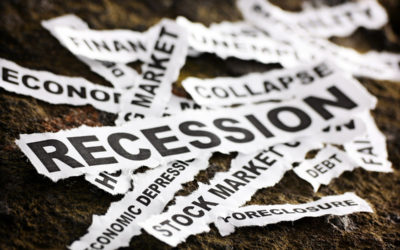Self-employment isn’t for everyone. Most people are uncomfortable pursuing a professional path paved with personal sacrifice and risk. Motivated entrepreneurs, however, accept the hazards as part of the gamble, embracing the challenge of business ownership. Among the many unpleasant possibilities facing self-starters willing to strike out on their own, personal and professional failure are occupational risks for small business entrepreneurs.

Each commercial venture’s success relies on someone’s vision for the future. Whether it’s identifying short-term market trends, or planning for the long haul, your unique perspective as an owner/operator is what sets you apart from competitors. Armed with projections for the future, it’s natural for you to make business decisions and expend company resources based on your beliefs – because you think something is going to happen.
The more often your business predications pan out, the better chance you have of finding prolonged commercial success. Unfortunately, despite your best efforts to pinpoint trends and accurately predict outcomes, you won’t get it right every time.
Finding Value in Failure
It is thought the overall 5-year failure rate for US small business is more than 50-percent. The daunting statistic underscores the prevalence of outright commercial failure, but it only accounts for businesses that go under. The actual rate of failure among small business operators is much higher – they fall short every day, in one way or another. When you make mistakes running your business, coming to terms with failure is just as important as correcting the consequences of your errors.
As a primary decision maker for your organization, it’s essential for you to develop thick skin, responding to business setbacks. Though failure is a sour prospect, it doesn’t represent the final chapter for you or your business. Whether they are due to miscalculation, misappropriation, or any other misstep, business failures furnish tools you can use to improve your future prospects.
Don’t Panic
Seasoned entrepreneurs are familiar with business failure, so they are better prepared than startups when things don’t go as expected. If your business is new, or you’re just not used to coming up short, even minor failures can send you into a tailspin. While it’s important to take matters seriously, feeling flustered from failure interferes with your ability to adjust and move forward. As you turn things around following a slip-up, it’s important to stay calm and focused on the solution, rather than getting worked-up about your mistakes.
You’re Not Alone
Business visionaries may be smart and creative, but they also apply a liberal dose of perseverance, achieving success. Many top entrepreneurs stumble before finding their stride, only to dust themselves off and try again. From Milton Hershey to Walt Disney, failure has long served entrepreneurs as a source of motivation and inspiration. Just as early missteps helped propel these and other business titans to prominence, you can use your own professional failures to spark new ideas and better performance.
Fail More?
Countless figures from history and popular culture have weighed-in on the value of failure. One interesting theme seen among successful businesses people is that not failing frequently means you’re not trying hard enough. Though it could be dismissed as pure optimism, the notion actually may hold up when put to the test. If failing provides lessons that make you better, then failing more often should speed up your business education, right?
While you may not want to start orchestrating ways to fail, you should scrape as much knowledge and understanding as possible from each business blunder. More importantly, fear of failing should never prevent you from trying viable business strategies. In terms of new products, untried promotions, and innovative service models, each failed launch could be the next stepping-stone to your breakout business success.
Correct Your Shortcomings
Identifying the source of failure helps entrepreneurs avoid making the same mistake twice. And when failures arise due to systemic breakdowns, isolating their cause gives business owners the information needed to make corrections.
Be honest with yourself when examining problems, because your own decisions may be responsible for the unintended failure. For a broad perspective on what went wrong, it pays to elicit feedback from business associates and team members. Once you’ve reached consensus on the source of an organizational failure, it becomes easier to fill the hole, utilizing appropriate solutions. If you’re behind the problem, having failed to make the right call, further training or business education may be required, bringing you up to speed.
Failure is underrated. Each business fiasco, missed opportunity, and professional letdown brings with it a number of valuable takeaways. For starters, learning hard lessons eliminates bad behavior from your repertoire, helping you avoid the same problems in the future. And viewing mistakes as stepping stones to success makes it easier for you to shake-off errors and focus on the future of your business.
When you make a bad business decision, the only way to reverse it is with another, better, decision that corrects the first. By applying the knowledge and insight you gained, missing the mark, you’re less likely to falter again.
Details
Taking Lending to The Next Level
Challenge
Not everyone has a perfect credit history, and yet everyone needs financial help sometimes.
We seek to make it easier for everyone to find the funding options that work, in any situation.
Our challenge is to match you with your best funding options.
Solution
Relying on the partnerships of more than 30 years in financial services, we have answers. Every situation is different, and we don’t treat you like a number – we listen to your needs, and find the right fit for you.
Our solution is to listen to your needs, and custom fit your best possible deals.
Monthly Fundings
50M
Individuals Served
12K
Typical Savings
Testimonial
“I can’t believe how easy it was to get money from Bizoodle. I appreciate that more than anything, really…”
John Devonshire, Mobile, Alabama
Track Expenses Now to Save Time (and Money) Later
Financial management is a big feature of self-employment, but not all entrepreneurs get excited about crunching numbers. Finance experts aside, many small business owners would like to handle their finances without a lot of fanfare, covering all the accounting...
Controlling Cash Flow – Steer Clear of These Common Spending Mistakes
From personnel matters to inventory control, effective small business management crosses multiple disciplines, calling on owners to address various commercial concerns. Among the diverse affairs handled by entrepreneurs, maintaining a healthy financial bottom line is...
Don’t Underestimate the Value of a Food and Beverage Business Plan
Small business planning accounts for all the particulars that make each operation unique. In addition to industry-specific considerations, small business owners may also benefit from several universal strategies, known for helping diverse, independent, commercial...
The Benefits of Content Marketing for Small Businesses
One of the most important jobs facing any online entrepreneur is self-promotion. Naturally, you want to increase public awareness of your company and begin to build up a reputation for your company. More importantly, you need to start pulling new customers to your...
How to Prepare Your Business for a Future Recession
Americans started off the new year on the back of a strong economy, and business owners across the country were able to welcome 2022 with a fair amount of optimism. The Gross Domestic Product (GDP) numbers are healthy (if not necessarily spectacular), the unemployment...
Safety in the Workplace – How to Protect Your Business and Your Employees
As a business owner one of your priorities should be creating a safe and secure workplace for your employees. By maintaining a safe workplace you encourage employee loyalty, increase productivity and remove harmful distractions that can adversely impact the success running of your business.
Staffing to Meet Retail Demand
The retail landscape has undergone a pronounced transformation during recent years. A business model once dominated by brick-and-mortar transactions and mail-order fulfillment has dramatically changed in order to accommodate online sales.








